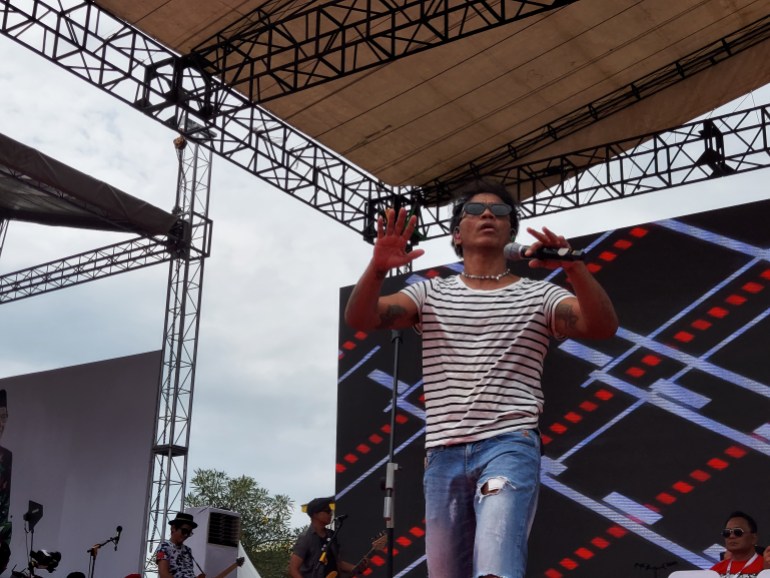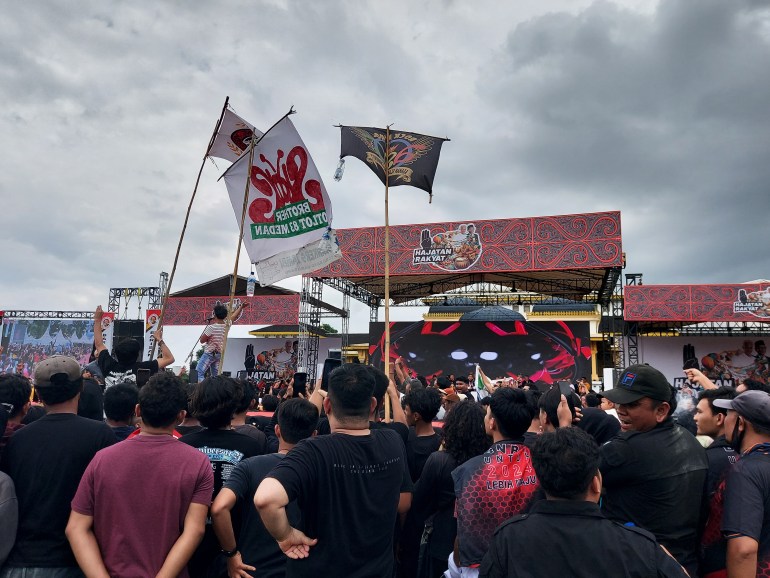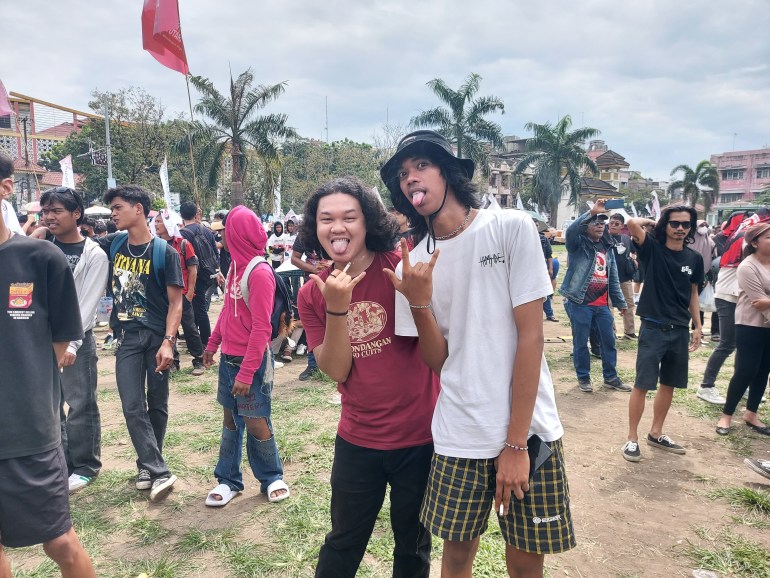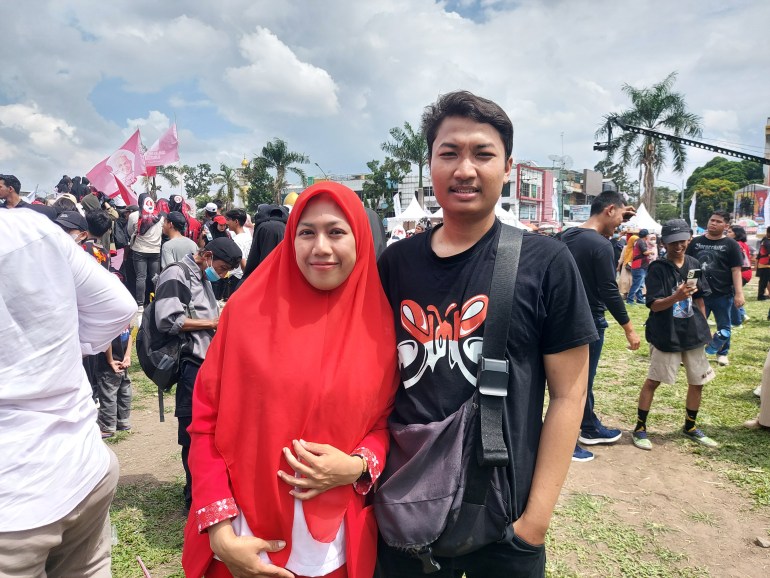‘Slank U’: Indonesian presidential candidates try to harness power of music | Elections News

[ad_1]
Medan, Indonesia – On a blisteringly hot and thundery day in the city of Medan, fans peeled off their T-shirts and hoisted each other up onto shoulders to get a better view of one of Indonesia’s most famous rock bands.
“Don’t forget to spread the virus of peace across Indonesia” Slank’s frontman and lead vocalist, Akhadi Wira Satriaji, better known as Kaka, screamed to the thousands of people who had come down to Istana Maimun, the palace of the Sultanate of Deli, to rock out with their favourite band.
The crowd, known as “Slankers”, roared their approval and grabbed selfies with their idol, as Kaka crouched near the edge of the stage, shaking hands and bumping fists with thrilled fans.
But while the atmosphere was electric, Slank had not come to Medan on Indonesia’s western island of Sumatra, just to put on a good show.
In Indonesia, there is a tradition of presidential and vice presidential candidates enlisting popular musicians in their campaigns in an attempt to boost their electability.
“Political elites and political parties have actually been using artists to gain support or votes for a long time,” said Hikmawan “Indra” Saefullah, who played guitar in the Indonesian indie band Alone at Last from 2002 to 2013 and is a lecturer in Indonesian Studies at the University of New England.

“Whether it is effective or not is rather difficult to measure unless you want to wait until the election results come out. Even then, it is difficult to know for sure whether a candidate’s victory was the result of votes from a supporting artist’s fans or not. Because voting is secret. So who knows?”
The Slank gig was organised in conjunction with a visit to the city by presidential hopeful and former governor of Central Java, Ganjar Pranowo, and his running mate Mahfud MD, the former coordinating minister for politics, legal and security affairs.
A natural fit
To some supporters, the concert was the perfect mix of music and politics.
Johnny and Dian, both construction workers, told Al Jazeera that they were lifelong Slankers and fervent supporters of Ganjar.
“We like their songs because they are easy to listen to and understand, and they appeal to young people,” 30-year-old Johnny said. “Slank also often come to Medan to perform and we also go to see them.”
Dian, also 30, added that he liked Slank because they “sing from the heart” and that he would vote for Ganjar and his party, the Indonesian Democratic Party of Struggle (PDI-P), because Slank supported them.
For Dian, the band and the candidates are a natural fit. He noted Slank was interested in social justice, while the PDI-P, a secular-nationalist party, had traditionally been affiliated with the interests and rights of workers across Indonesia.
“Ganjar will work for the people and will make changes for the Indonesian populace. He supports grassroots workers more than other candidates,” Dian said.

Slank was founded in 1983 by a group of then-teenagers in Jakarta and takes its name from the term “slange’an” which means “free men” in Betawi, the language of the Betawi ethnic group in the capital.
Slank has also long been known for the political nature of many of its songs and lent its support to current Indonesian President Joko Widodo, popularly known as Jokowi, when he ran for the presidency in 2014 and 2019 on a PDI-P ticket.
Now that Ganjar is the PDI-P presidential candidate (Jokowi has served the maximum two terms in office), Slank is also backing him ahead of the presidential election on February 14.
“They want to build a perception among the public that they will be left behind or ‘not cool’ if they don’t support the PDI-P and Ganjar [by saying], ‘See, Slank support him, why wouldn’t everyone else?’” lecturer Saefullah said of the alliance.
Also in the crowd at the concert were market-sellers 34-year-old Ratna and 28-year-old Lisa who said that they had come to the event to support Ganjar who they praised for being “an intellectual candidate”.
Among his election promises, Ganjar has said will improve Indonesians’ work life, including raising salaries, paying off farmers’ debts and eliminating the corruption and nepotism that have long plagued the job market in Indonesia.

He has also pledged to distribute social assistance more evenly and widely across the archipelago of 278 million people.
“The cost of living is rising in Indonesia and essentials are becoming more expensive,” Ratna said. “Rice and cooking oil are more expensive now while salaries are still low. We want salaries to be reasonable, which is why we support Ganjar.”
No guarantees
However, not everyone in the crowd was convinced.
Mulia, a 20-year-old communications student at the State Islamic University of North Sumatra, told Al Jazeera that he had come to the concert to see Slank but that he had yet to decide who to vote for.
“Maybe I will choose Ganjar. It seems like he is close to young people and he might do more for the youth of Indonesia if he is elected,” he said.
“It depends how I feel when I see him. If I like him, then I’ll vote for him.”
Ganjar, himself, made only a brief appearance at the concert.

Given a traditional Sumatran welcome dance, he made his way through the crowd, a flower garland around his neck, greeting supporters who screamed and grasped his hands while taking selfies on their phones.
But, while Ganjar stood alongside Kaka and clapped enthusiastically to the music, he did not address the crowd and soon left for another event with running mate Mahfud.
Other candidates are also hoping the power of celebrity translates into votes.
Former Defence Minister Prabowo Subianto and running mate Gibran Rakabuming Raka, who is also Jokowi’s oldest son and the current mayor of the city of Surakarta or Solo, have been endorsed by Indonesian rock band Dewa 19.
Meanwhile, Rhoma Irama, the so-called “King of Dangdut”, a form of Indonesian folk music, has thrown his support behind the former Governor of Jakarta Anies Baswedan and the deputy speaker of the People’s Representative Council, Muhaimin Iskandar.

‘Slank U’
Back at Istana Maimun, 19-year-old Lufti and his five friends were waving a flag bearing Slank’s logo, and said that they were a mix of Prabowo and Anies voters and had no intentions of voting for Ganjar.
“We are hardcore Slankers because their songs are amazing and so fun to listen to,” Lufti said.
“I won’t vote for Ganjar because Prabowo is my idol,” he added. “I will always choose Prabowo because he has vowed to keep the country safe and guard our national interests.”
Tio, wearing a Slank-themed T-shirt embossed with the words “Slank U”, was at the concert with his wife Cindy.
They said they were there “to see Slank first and Ganjar second”.
“I love Slank because they are such creative musicians and they preach a message of peace,” the 20-year-old entrepreneur told Al Jazeera.
“They make their songs for the people and they always supported Jokowi when he was running for office,” Tio said of his favourite band.

But Tio’s support also highlights the potential risk politicians face when they seek endorsements from rock bands.
“I will vote for Ganjar now because of Slank’s endorsement,” Tio said. “But if they decided to support another candidate like Prabowo, then I would follow Slank and support Prabowo too.”
[ad_2]



